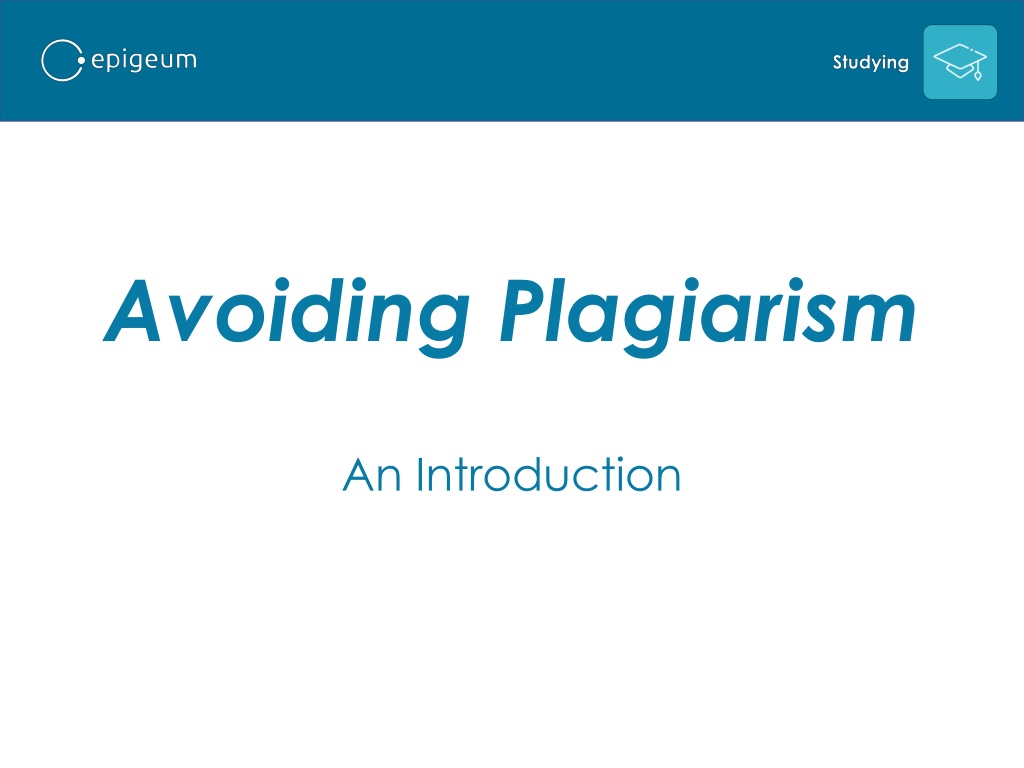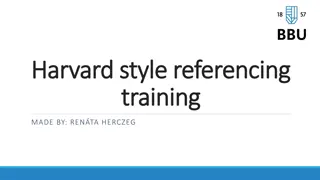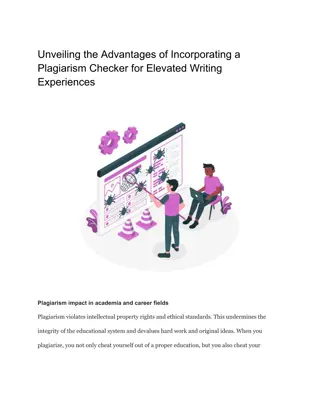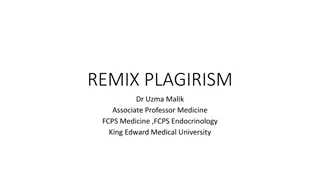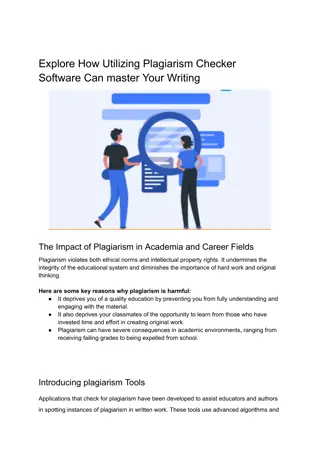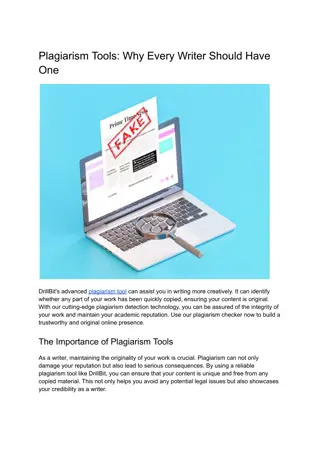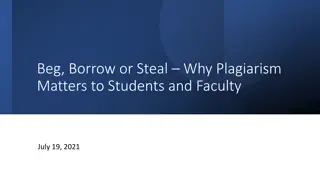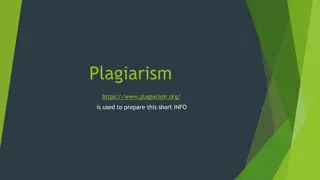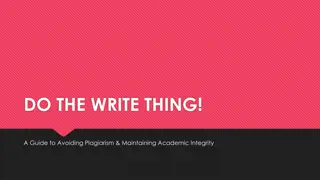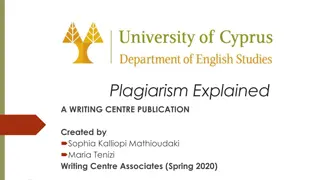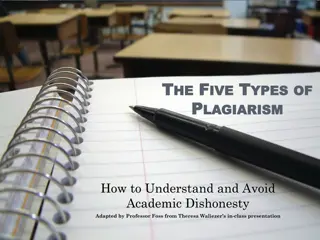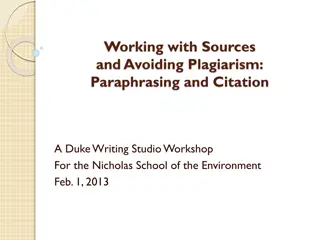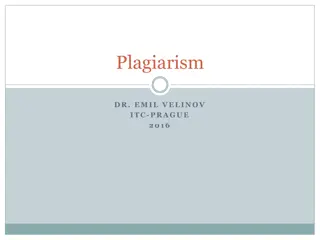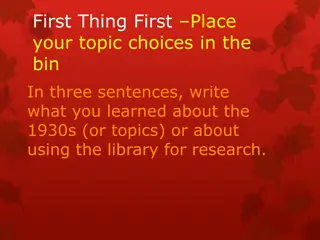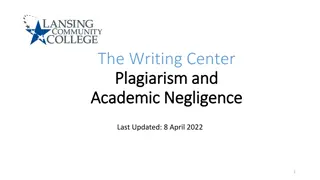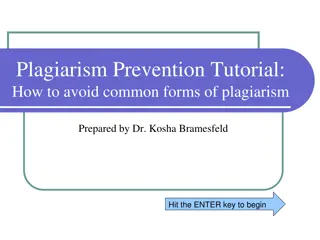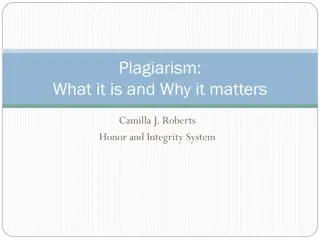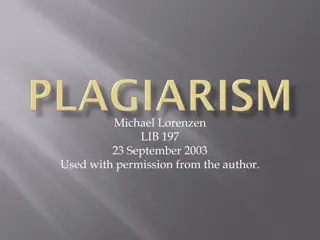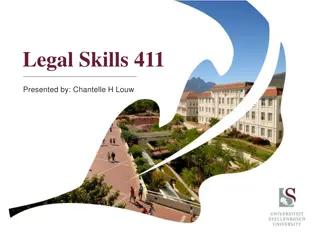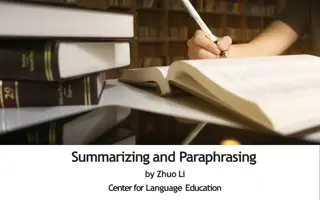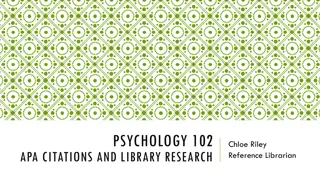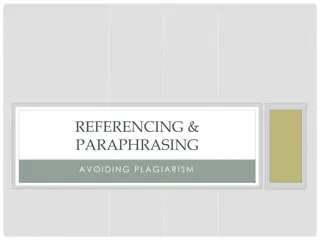Avoiding Plagiarism
Avoiding Plagiarism is an essential online course designed to help students understand proper referencing, paraphrasing, and citing practices. Empower your students to prevent plagiarism with clear guidance and strategies. Stay updated with key changes and expert insights
Download Presentation

Please find below an Image/Link to download the presentation.
The content on the website is provided AS IS for your information and personal use only. It may not be sold, licensed, or shared on other websites without obtaining consent from the author.If you encounter any issues during the download, it is possible that the publisher has removed the file from their server.
You are allowed to download the files provided on this website for personal or commercial use, subject to the condition that they are used lawfully. All files are the property of their respective owners.
The content on the website is provided AS IS for your information and personal use only. It may not be sold, licensed, or shared on other websites without obtaining consent from the author.
E N D
Presentation Transcript
Avoiding Plagiarism An Introduction
About Epigeum Founded at Imperial College London in 2005, Epigeum was acquired by Oxford University Press in 2015 and later by SAGE Publishing in 2023. We are a leading provider of interactive, online courseware for universities and colleges worldwide making consistent, cost-effective training achievable for all. Watch our introductory video
Epigeum Programmes Epigeum programmes support the core activities of universities and colleges in three key areas. Evidence-based learning design, cutting-edge technology, and comprehensive subject knowledge ensure that each programme delivers training of the highest quality.
Epigeum Study Programmes Focusing on student experience and satisfaction, Epigeum s studying programmes support colleges and universities in creating an environment in which all learners can grow in independence and confidence.
Avoiding Plagiarism Avoiding Plagiarism is an introductory online course designed to ensure your students follow best practice in referencing, paraphrasing and using citations. By taking this course, students will gain a better understanding of what constitutes plagiarism and will receive clear guidance on appropriate referencing, citation and paraphrasing of other people s work. Students will also be encouraged to develop a variety of strategies to help avoid plagiarism in their work. The emphasis is on positive rather than penal messages. The course provides universities with evidence that students have received training in how to avoid plagiarism.
Avoiding Plagiarism: Key Updates The update will ensure the programme reflects the current context and requirements around plagiarism in academic studies; and learners are equipped to deal with emerging developments and challenges. Key changes include: The content has been updated and streamlined to fit the current context New Unit structure Improved balance between text and activities Brand new video interviews with students and tutors Additional key terms and definitions on relevant screens New set of current plagiarism stories from across sectors Updated format and design, ensuring the course easily navigable and the functioning of the activities more intuitive
Avoiding Plagiarism: Expert Panel Authors Dr Benita Cox Programme Director of Imperial College Business School s MSc International Health Management Dr Karen Handley Reader, Department of Business and Management, Oxford Brookes University The course was periodically reviewed and updated in consultation with: Professor Mark Brown Director of the National Institute for Digital Learning, Dublin City University, Ireland Dr Douglas Halliday Director of the Multidisciplinary Doctoral Training Centre in Energy, University of Durham Dr Helen Laville Head of the Department of American and Canadian Studies, University of Birmingham Dr Amanda Tinker - Academic Skills Coordinator and Senior Lecturer, University of Huddersfield Dr Erica J. Morris - Principal Fellow of the HEA, Independent Higher Education Consultant Dr Natalie Lloyd - Academic Developer, College of Healthcare Science, James Cook University (Australia) Dr Nathan Roberts - Education Development lead, Cardiff University Dr Simon Lee-Price SFHEA - Senior Lecturer Learning Development, Buckinghamshire New University Dr Zeenath Khan - Assistant Professor, University of Wollongong Dubai
Avoiding Plagiarism: developed in collaboration with Anglia Ruskin University University of Brighton Bournemouth University University of Edinburgh Cardiff University University of Hertfordshire Durham University University of Leicester Imperial College London University of London Nottingham Trent University University of Southampton The Open University University of York University of Bath University of Zurich University of Birmingham
Avoiding Plagiarism: Module Structure Approximately 1 hour of core activities. Designed to support undergraduates and act as a reminder for postgraduates, suitable for all disciplines areas. Module 4: Avoiding Plagiarism Module 3: Referencing Module 1: What is plagiarism? Module 2: Plagiarism: In context Strategies for avoiding plagiarism Practice scenario 4 The importance of referencing Referencing systems Citations and references References from online sources Referencing tools Practice scenario 3 Introduction (what is plagiarism) Student perspectives on plagiarism Tutor perspective on plagiarism Plagiarism: Key terms Practice scenario 1 Plagiarism in the news Types of plagiarism Unintentional plagiarism Paraphrasing How is plagiarism detected? Practice scenario 2
Avoiding Plagiarism: learning outcomes By the end of this course students will be able to: Define plagiarism and describe different types of plagiarism Recognise and describe key terms relating to plagiarism Explain the importance of referencing Compile accurate citations and references Correctly paraphrase and acknowledge others' work Make better use of referencing software to manage your citations and references Develop strategies to help you avoid plagiarism in your own work.
Avoiding Plagiarism: course features Student and tutor views interviews with students giving their thoughts on plagiarism. Scenarios interactive scenarios that illustrate some of the situations students may encounter throughout their studies. Plagiarism in the news online resources to help extend learning, including articles on real-life cases of plagiarism. Practice exercises interactive activities to help identify plagiarism, explain key terms and practise how to correctly cite and reference different sources. Review quizzes multiple choice quizzes to revise what plagiarism is and test student knowledge.
Avoiding Plagiarism: what does the course look like?
Avoiding Plagiarism: decision makers/ purchasers Director Academic Affairs/Services Director/Head International Office Pro-Rector/Pro Vice Chancellor Education/Vice President Teaching & Learning Director/ Head Student Experience Head Student Support/Student Affairs Director/Head Libraries/Information Services Director/Head Teaching and Learning Deans of Students/Undergraduates Director/Head Academic Skills Centres Director/Head of Degree Programmes Director/Head/Dean Faculties Director/Head/Dean of Education/Teaching & Learning for Faculties
Implementation and customisation Avoiding Plagiarism can be hosted on your institution s Virtual Learning Environment, or you can provide access for your students via Epigeum s dedicated online platform. Avoiding Plagiarism is accompanied by an Instructor Manual, as well as other resources to support you to implement the programme at your institution. However you choose to deliver Avoiding Plagiarism, we will provide on- boarding and technical support every step of the way, in the form of promotional tools, workshops, and webinars.
Visit our website for more about Avoiding Plagiarism: https://www.epigeum.com/courses/studying/avoiding-plagiarism/
